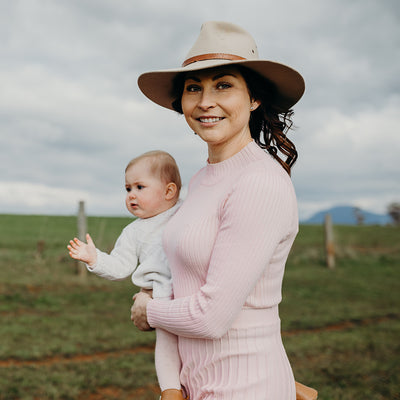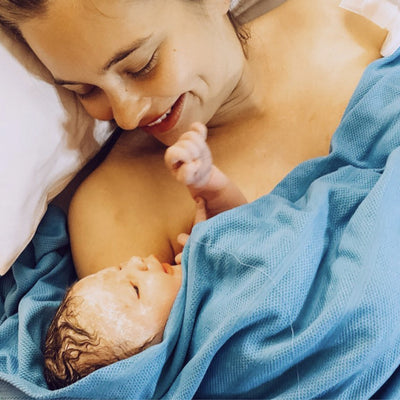
Would you run a marathon without really considering what was involved? Surely not! You want to work towards a position where your body and mind are best primed to get you comfortably across the finish line. Birth should be no different.
A coach, a cheer squad, the perfect playlist, your favourite snacks, the likeness is uncanny! Understanding the birth process means you can (somewhat) surrender to the experience and trust your preparation will allow you to navigate each stage of labour.
Education, while scary/confronting/overwhelming, opens up the possibilities to what your birth experience could look like, aligns you and your partner’s goals, and provides you with an informational tool kit to call on as needed. We spoke with the leading voice for birth education in Australia, Sophie Walker, Founder and Host of Australian Birth Stories, asking why all mums-to-be should make a concerted effort to get to know the birth process well before their waters break.
What advice do you have for first-timers who are nervous about birth and unsure where to start their education journey?
I want them to know that their experience is really normal. Most women start their pregnancy journey with very little knowledge of birth and often that knowledge is fear-based. Fear is a normal part of pregnancy but acknowledging your fear and actively letting it go is a significant part of your birth preparation. From there you can learn about the process of labour and birth (and possibly think it’s all quite remarkable), acquire birth skills that will help you navigate contractions and understand the role of intervention (and how it may help or hinder your labour). The best place to start is by listening to other women’s birth stories and there are over 350 on the Australian Birth Stories podcast.
What are the risks of walking into your birth (whatever that may look like) with little knowledge of the process?
Research says that a positive birth experience is dependent on two things: a woman being able to make informed decisions, and those decisions being supported and respected by her midwife or obstetrician. We can only make informed decisions if we’re educated about labour and birth, and understand what we want from the experience. And if we’re not educated, we are just “going with the flow.” In the hospital system, this “flow” will most likely be a labour and birth with intervention. For instance, 49% of low-risk first-time mums are induced and we know that medical induction of labour often kickstarts the “cascade of intervention” whereby you’re more likely to have an epidural, instrumental birth or emergency caesarean. When a woman feels unsupported or unheard in her labour and birth she’s more likely to consider her experience as traumatic. Sadly, one-third of Australian mothers have birth trauma which is a confronting statistic considering Australia is one of the safest places in the world to give birth.
Can you talk us through some of the birthing decisions a woman might encounter throughout labour?
The first one is choosing your care provider and this happens right at the start of pregnancy when most women don’t know where to go for information or advice. Your chosen care provider and place of birth can greatly dictate your labour and birth experience so being aware of your options pre-conception is a really great first step.
Most first-time mothers (85%) will go past their estimated due date and that’s when many care providers will suggest an induction to kick-start labour. Inductions are sometimes necessary for the health of the mother and baby but they can also be unnecessary and statistics show that an induced labour is more painful and is more likely to result in intervention. Making an informed choice to avoid or prolong an induction is one of the most common decisions a first-time mother birthing in hospital will have to make. If she is nearing 42 weeks, she may opt for daily visits to the hospital for CTG monitoring and an ultrasound to ensure that the baby is still happy and there aren’t any medical concerns that deem an induction necessary.
Informed choice in labour refers to everything from how a baby is monitored (doppler, CTG or fetal scalp monitor) to whether a woman wants vaginal examinations, how she wants to be spoken to, who she wants in the room, and whether she wants her midwife to offer pharmacological pain relief or support her with natural pain relief (ie. massage and water).
An informed and educated birth support person is a woman’s best advocate when she’s deep in labour and unable to make decisions for herself. Some women can’t verbalise how they’re feeling or what they want in labour so a prepared support person needs to do the talking for her.
You’ve interviewed over 350 Australian women on Australian Birth Stories, what are some (if any) of the common threads between these conversations?
The most common thread is the power of birth education because I hear from women who didn’t do any education and on the flipside, those who actively prepared for birth from the moment they peed on a stick. I’m both of these women; in my first pregnancy I did very little preparation and I went into labour naively hopeful yet with very limited understanding of labour and even fewer skills to navigate the inevitable challenges. I distinctly remember the point where I gave in and I subsequently experienced a gamut of interventions which resulted in an epidural, forceps-assisted birth and postpartum haemorrhage. In my second birth I was determined to do it differently so I read every book, listened to birth stories and embraced all the birth education out there. I went into labour with practical skills and a strong mindset and my experience was positive and empowering. Every pregnant mother should have access to quality birth education that informs, encourages and inspires her and that’s exactly why I created my online education program, The Birth Class.
During your first pregnancy, birth chatter can be quite overwhelming. Are there any gentler episodes of ABS you’d recommend listening to?
Yes, I recently compiled five positive birth stories to inspire pregnant mothers. You can access them right here.
One of the many incredible women you’ve connected with just so happens to be Gro-To founder, Zoë Foster Blake (who suffered from gestational diabetes, osteitis pubis, and mastitis)! Why is it important to share imperfect pregnancy stories?
I think the notion of a perfect pregnancy is false yet social media fuels the belief that it’s normal. I’ve had a few guests on the podcast mention the “Instagram pregnancy” they didn’t have and that’s just heartbreaking. The truth is that no one is sailing through pregnancy without challenges and that’s one reason the podcast is so powerful because it is an honest account of pregnancy, birth and postpartum; the confronting, debilitating and empowering experiences that are normal yet not often discussed. When people like Zoe share their challenges it reinforces the notion that pregnancy doesn’t discriminate.




Comments